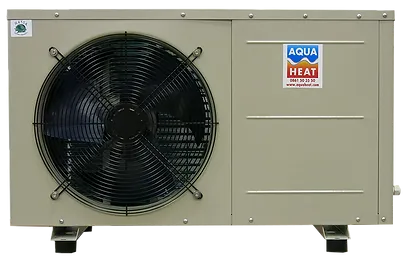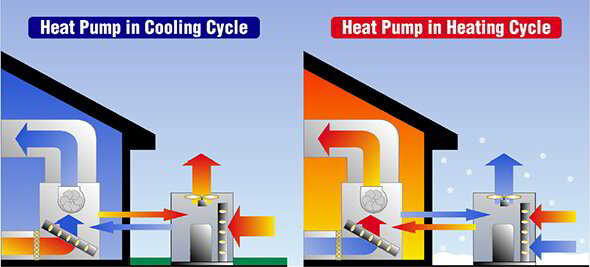Aquaheat Domestic Heat Pump 3.6KW (100L - 150L)
SKU 21467
R14 944.25
Price incl. VAT (15%) R1 949.25
Out of stock, available for pre-order
1
Save this product for later
Customer reviews
Reviews only from verified customers
No reviews yet. You can buy this product and be the first to leave a review.
Aquaheat Domestic Heat Pump 3.6KW (100L - 150L)
Product Details
Brand: Aquaheat
Weight: 55.00 kg
Aquaheat Domestic Heat Pump 3.6KW (100L - 150L)
Are you tired of sky-high heating bills and inefficient heating systems? Look no further than Aquaheat's Standard HWD series of air source heat pumps. These innovative systems provide efficient and eco-friendly heating solutions for your home.
About Heatpumps
- Heat pumps owe their high efficiency to the constant nature of thermal energy.
- Thermal energy remains in the air even in freezing temperatures.
- Heat pumps function best with outdoor temperatures of above 40℉ (+4C) and begin to lose their efficiency when temperatures drop that mark.
- Heat pumps function with less efficiency than furnaces when temperatures drop below 25℉ (-4C).
- This reduction in efficiency occurs because of the reduced levels of thermal energy present at lower temperatures.
Specifications
- Model number: HWD3.6
- Heating capacity: 3.6kW
- Running current: 4.1A
- Power supply: V/Ph/Hz 220/1/50
- Heating Capacity: 12,283 BTU/h
- Heating Power Input: 0.87 kW
- COP: 4.14
- Compressor: Scroll compressor
- Heat Exchanger: Pipe in Shell
- Fan Quantity: 1
- Fan Rotation Speed: 830 RPM
- Water Connection: ¾" Female
- Water Flow Volume: 75 L/h

Key Features of the Aquaheat Standard HWD Series
- High Energy Efficiency: Achieve significant energy savings.
- Quiet Operation: Minimizes noise disturbances.
- Compact Design: Fits seamlessly into various spaces.
- Easy Installation: Simple setup process.
- Durable Construction: Built to withstand harsh weather conditions.
Why Choose Aquaheat?
- Energy Efficiency: Reduce your carbon footprint and save on energy costs with our highly efficient heat pumps.
- Quiet Operation: Enjoy a peaceful living environment with our low-noise technology.
- Reliable Performance: Our heat pumps are built to last, providing years of reliable service.
- Easy Installation: Simple installation process for a seamless experience.
- Eco-Friendly: Utilize environmentally friendly refrigerants.

Frequently Asked Questions (FAQ's)
What is a heat pump?
- A Heat Pump is a machine similar in principal to an airconditioner that works in reverse cycle.
- It extracts heat from the outside atmosphere and transfers it to water (eg your swimming pool) thereby increasing the water temperature.
How does a Heat Pump work?
- A Heat Pump works by removing the heat from the surrounding ambient air and transfers this heat through a heat exchanger by means of pumping the swimming pool water through it and back to the pool.
- The pool’s temperature is controlled thermostatically to the required temperature.
What size Heat pump do I need?
- The size of a Heat Pump is based on the size of your swimming pool’s surface area and the volume of water in the pool.
- These factors together with the desired temperature of the water will determine the size of the Heat pump.
Where do I position the Heat Pump?
- A Heat pump is positioned as close as possible to the swimming pool filtration system.
- It is designed to be used out doors and does not require any covering against the elements.
- In fact if a Heat Pump is covered during operation it will not perform optimally.
How complex is the installation of a heat pump?
- The heat pump is a single, compact, easily installed unit.
- A 220-volt dedicated circuit and attachment to your existing pool pump is basically all that is required.
- The machine must meet a minimum clearance requirement, to insure proper airflow.
- Proper placement is critical to the performance of the pool/spa heat pump.
- A concrete slab may be required unless there is enough room on an existing slab.
- If a chlorinating device is present it must be placed downstream from the heat pump and a check valve must be installed to prevent chemical damage.
What is the operating cost?
- Compared to other types of heating equipment, (with the exception of solar heaters, which only heats when the sun is present) the AQUAHEAT pump is very economical.
- Two types of energy sources are utilized to produce the required heat output.
- This is the heat from the ambient air and electrical power used to run the compressor.
Is there any maintenance required for a heat pump?
- There is no attention required by a Heat Pump as with air conditioner.
- Simply remove any leaves, grass, paper, etc. which occasionally collects from the air.
- The pool chemistry should always remain balanced.
- The evaporator grills are coated to prevent corrosion.
- However if you live near a salt-water environment you may want to hose down the outside evaporator coil to help prevent the build up of salt and rust.
Can a heat pump heat a pool overnight?
- Yes. However it all depends on the size of the pool and the time of year. Heat pumps are made to maintain pool temperature on a daily basis.
- If the heat pump is sized properly to the pool size, once the desired temperature is reached it will automatically maintain that temperature all month long.
What are kW and BTU?
- Electricity is sold by a unit called “kilowatt-hour”. One “kilowatt-hour” is equal to 3412 BTU.
- BTU stands for British Thermal Unit.
- It is a unit of measure that some heat pump manufacturers use on their specifications.
What does COP mean?
- COP stands for Coefficient of performance ie. The ratio of energy output to energy input.
- This is dependent on the ambient air temperature and the temperature of the water of the swimming pool.
- It tells you the energy efficiency rating of the heat pump.
Why should I use a solar blanket or pool cover?
- As with all swimming pool heating systems you are advised to use a pool cover when the swimming pool is not in use.
- This will keep evaporation (the greatest heat loss) to a minimum and so reduce the overall pool heating costs and unwanted frustrations.
- A pool cover can cut total heat loss by 50% to 95%.
Will the AQUAHEAT unit run all the time?
- No! At the beginning of the season you set the electronically programmable thermostat to the desired temperature.
- Once set, it will monitor the swimming pool water temperature and only start the unit when required. (eg. When the pool water temperature drops below the required temperature).
How is an AQUAHEAT heat pump controlled?
- It is controlled by the programmable electronic thermostat on the control panel which has a digital temperature display.
What is the lowest ambient air temperature at which the AQUAHEAT heat pump can work?
- 6 degrees Celsius
Will the AQUAHEAT heat pump ever need more freon?
- The AQUAHEAT heat pump has a sealed refrigeration system that is filled with a refrigerant called “freon”. The factory charge of freon should last for the life of the unit.
- Freon is a very stable gas and should not degrade or breakdown even under severe operating circumstances. If your unit needs freon it probably has a leakage which must be located and repaired before more freon is added, otherwise the problem will not be resolved.
- Fortunately freon leaks are rare and usually only occur due to shipping damage.
Is there any maintenance required for a Heat Pump?
- The heat pump should be serviced once a year.
Display prices in:ZAR


